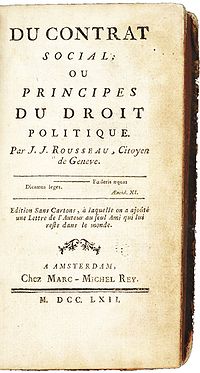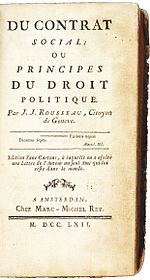- The Social Contract
-
This article is about Jean-Jacques Rousseau's 1762 treatise. For "social contract" as a political and philosophical concept, see Social contract. For other meanings, see Social Contract (disambiguation).
Of The Social Contract, Or Principles of Political Right 
Title page of the first octavo editionAuthor(s) Jean-Jacques Rousseau Original title Du contrat social ou Principes du droit politique Country Kingdom of France Language French Publication date 1762 Of The Social Contract, Or Principles of Political Right (Du contrat social ou Principes du droit politique) (1762) by Jean-Jacques Rousseau, is the book in which Rousseau theorized about the best way in which to set up a political community in the face of the problems of commercial society which he had already identified in his Discourse on Inequality (1754).
Man is born free, and everywhere he is in chains.[1]
The Sovereign, having no force other than the legislative power, acts only by means of the laws; and the laws being solely the authentic acts of the general will, the Sovereign cannot act save when the people is assembled.[2]
Every law the people have not ratified in person is null and void — is, in fact, not a law.[3]
The legislative power belongs to the people, and can belong to it alone.[4]
The Social Contract was a progressive work that helped inspire political reforms or revolutions in Europe, especially in France. The Social Contract argued against the idea that monarchs were divinely empowered to legislate; as Rousseau asserts, only the people, in the form of the sovereign, have that all powerful right.
- The heart of the idea of the social contract may be stated simply: Each of us places his person and authority under the supreme direction of the general will, and the group receives each individual as an indivisible part of the whole...
Contents
Overview
 Title page of a pirated edition of the Social Contract, probably printed in Germany. [5]
Title page of a pirated edition of the Social Contract, probably printed in Germany. [5]
The stated aim of the Social Contract is to determine whether there can be a legitimate political authority. In order to accomplish more and remove himself from the state of nature, man must enter into a Social Contract with others. In this social contract, everyone will be free because all forfeit the same amount of freedom and impose the same duties on all. Rousseau also argues that it is illogical for a man to surrender his freedom for slavery; and so, the participants must be free. Furthermore, although the contract imposes new laws, especially those safeguarding and regulating property, a person can exit it at any time (except in a time of need, for this is desertion), and is again as free as when he was born.
Rousseau posits that any administration, whatever form it takes, should be divided into two parts. First, there must be the sovereign (which Rousseau states must consist of the whole population) who represents the general will and is the legislative power within the state. The second division is that of the government, being distinct from the sovereign. This division must be since the sovereign cannot deal with particular matters (it is then acting as particular wills and not the general will — the sovereign is no longer whole and therefore ruined), like applications of the law. Therefore a government must be separate from that of the sovereign body.
Rousseau claims that the size of the territory to be governed often decides the nature of the government. Since a government is only as strong as the people, and this strength is absolute, the larger the territory the more strength the government must be able to exert over the populace. In his view, a monarchical government is able to wield the most power over the people since it has to devote less power to itself, while a democracy the least. In general, the larger the bureaucracy, the more power required for government discipline. Normally, this relationship requires the state to be an aristocracy or monarchy. It is important to note here that when Rousseau talks of aristocracy and monarchy he does not necessarily mean they are not a democracy in the sense we see it now - the aristocracy or monarch could be elected, being like Cabinet Governments or Presidents are today - when Rousseau uses the word democracy he refers to a direct democracy rather than a representative democracy like most democratic states have today. In light of all this, Rousseau argues that, like his native Geneva, small city-states are the form of nation in which freedom can best flourish. For any state large enough to require intermediaries between the people and the government, an elected aristocracy may be preferable, and in very large states a benevolent monarch; but even monarchical rule, to be legitimate, must be subordinate to the sovereign rule of law.
See also
- Social contract; the more general concept
Notes
- ^ The Social Contract, Book I, Chapter 1:Subject of the First Book.
- ^ The Social Contract, Book III, Chapter 12:How the Sovereign Authority Maintains Itself.
- ^ The Social Contract, Book III, Chapter 15:Deputies or Representatives.
- ^ The Social Contract, Book III, Chapter 1:Government in General.
- ^ R.A. Leigh, Unsolved Problems in the Bibliography of J.-J. Rousseau, Cambridge, 1990, plate 22.
References
- Wraight, Christopher D. (2008), Rousseau's The Social Contract: A Reader's Guide. London: Continuum Books.
External links
- Du contrat social (MetaLibri)
- The Social Contract at constitution.org
- Catholic Encyclopedia Based on an article critical of The Social Contract, written in 1908.
- SparkNotes entry on The Social Contract
- Rousseaus Gesellschaftsvertrag in Kurzform
- A site containing The Social Contract, slightly modified for easier reading
Categories:- 1762 books
- Philosophy books
- Works by Jean-Jacques Rousseau
- Social philosophy literature
Wikimedia Foundation. 2010.
